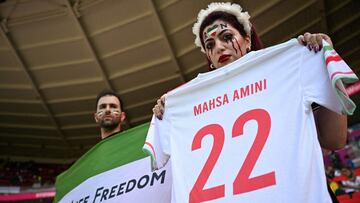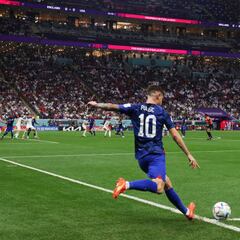Why has there been so many protests in Iran before the World Cup?
Iran’s World Cup journey has been dogged by events back home with manager, players, and fans forced to address the protests rocking the Islamic Republic.


Iran and the United States have not had a cordial relationship for nearly half a century. Since the 1979 Iranian revolution against the US-sponsored monarchy, both nations have been distrustful of one another. Ayatollah Ruhollah Khomeini, the first leader of the Republic, denounced the US as ‘the great Satan’ as they constantly sponsored efforts to challenge the new Islamic Republic.
The last time the two countries played each other in the World Cup in 1998. Dubbed by FourFourTwo magazine as “the most politically charged match in the history of the World Cup,” drama was inevitable even before a ball was kicked.
“One of the first problems was that Iran were team B and the USA were team A,” explained Mehrdad Masoudi, FIFA media officer, “According to FIFA regulations team B should walk towards team A for the pre-match handshakes, but Iran’s Supreme Leader Khamenei gave express orders that the Iranian team must not walk towards the Americans.”
Iran defeated the US 2-1. They play each other again today with international tensions as high as ever and playing out directly at this tournament.
Protests rocking a nation
While the Iranian team competes in Qatar, large unrest at home has threaten to unravel their tournament. Huge protests began more than two months again when Mahsa Amini, a 22-year-old woman, died in police custody. She had been arrested in Teheran for wearing her hijab too loosely by Iran’s morality police. The BBC reported that she was beaten in a police truck while in custody and later died of her injuries, despite what Iranian police claimed.
The news sparked the largest round of protests in Iran in years. Social media has shown women cutting their hair inpublic, protestors fighting police, and police shooting protestors.
TIME Magazin's Top 100 photos of 2022
— Firouz M. Naderi (@Firouz_Naderi) November 24, 2022
Unveiled woman standing on top of a vehicle as thousands make their way towards Aichi cemetery in Saqez, Mahsa Amini's hometown in the western Iranian province of Kurdistan, to mark 40 days since her death UGC/AFP/Getty Images#mahsaami̇ni̇ pic.twitter.com/u3mSjcumUd
Human rights groups such as Iran Human Rights report that at least 416 people, including 51 children, have been killed during the protests.
Can sport and politics be seperated?
As they represent the Iranian nation abroad, the men’s team is in a quandry. They have the uneviable task of balancing support for their country while being sympathetic to those being attacked by the government. Tensions were immediately high when the team met President Ebrahim Raisi before they travelled to Qatar, angering protestors for their apparent support of the government.
However, in a remarkable moment in the opening game against England the Iranian players refused to sing the national anthem as the stadium was engulfed in boos.
“There were people booing the national anthem,” Iranian fan Rana told the BBC, a false name, “There were people who didn’t applaud when the names of the players were called out.”
#BREAKING: Iran national team players choose not to sing national anthem at World Cup match; some of the Iranian crowed booing their own national anthem pic.twitter.com/RYPvgHMNUi
— Amichai Stein (@AmichaiStein1) November 21, 2022
Since then the Iranian players have been swept up in the swirling mass of political discussion inside and outside of iran. Fears grew of repercussions against the team due to their apparent disrespect of the nation. Mehdi Chamran, the chairman of Tehran city council, said, “We will never allow anyone to insult our anthem and flag.”
Other’s called for the team to be replaced with a revolutionary youth. A former player of the team, Voria Ghafouri, was reportedly arrested after the match for “insulting the national soccer team and propagandising against the government.”
It’s not the environment conjusive to the playing of football at a major tournament.
Head Coach Carlos Queiroz has been at the front of dealing with media questions from all angles. He has sought to unite the team, fans, and Iranian media behind the team without ignoring the problems inside the country.
He suggested in his final press conference before the match that the lesson from this World Cup is that football should “create an entertainment and during 90 minutes to make the people happy” before explaining his own youth where he worked with some of Mozambique’s poorest people, united by football.
This unity does not mean he has been happy to accept criticism or perceived unfairness. He criticised the BBC for asking his side political questions that they would refuse to ask England Coach Gareth Southgate as well as alluding to racism and school shootings in the US when US media quizzed about Iranian human rights..
Iran's football manager Carlos Queiroz confronts BBC correspondent Shaimaa Khalil after question to playerhttps://t.co/HoySrARapt pic.twitter.com/cNoL9T0WR0
— BBC News (UK) (@BBCNews) November 24, 2022
But perhaps this is all part of the plan to get people fired up and behind the football. Victory today against the US, against the ‘great Satan’ would undeniably achieve this.
Related stories

Mateu Lahoz to contain Iran vs USA

USMNT vs Iran: How can the USMNT qualify?
“Our mission is to bring smiles to the people for at least 90 minutes,” Querioz posited, “That is our mission.”
Iran vs USA kicks off at 2 p.m. ET at the Al Thumama Stadium.